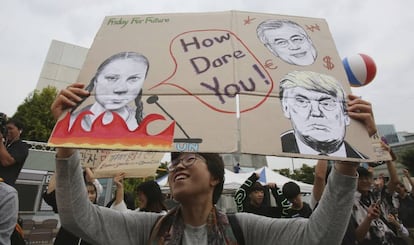Greta Thunberg: ‘Activism filled my life with meaning’
The 19-year-old Swedish environmental activist – turned into a global icon in the fight against climate change – is promoting her new book and thinking about what she should study


It’s pitch black at Stockholm Central Station after a 14-hour journey by train from Hamburg, Germany. Not travelling by plane was a condition to do this interview.
The appointment takes place a few hours later, on a sunny Saturday morning in early October, at the elegant Swedish branch of Polaris Publishing. At the agreed-upon time, a petite blonde girl – dressed casually in black pants, a grey t-shirt and sweatshirt – appears and chirps “Hello!”
Greta Thunberg needs no introduction. At the age of 15, the Swedish teenager staged a sit-in in front of her country’s parliament to raise awareness about the climate change threat. Today, she is a 19-year-old woman thinking about university.
“Why did you ask us to come by train?”
“Well, I don’t want people to fly just for fun, I guess.”
Thunberg is consistent. For years, she has refused to travel by plane due to the enormous environmental impact that flights generate. She’s vegan, she doesn’t buy new clothes and she moves around her city by bicycle. “But that’s mostly because it’s convenient for me,” she jokes.
She looks relaxed and happy: no sign of the sulky, bossy girl that was portrayed negatively by opponents during the 2018 School Strike for Climate. Supposedly, Greta wanted us all to go back to living in caves.
“It’s funny, because I never actually said that. That’s their own invention. It just shows how fragile some people are. They don’t want to be lectured at, especially not by a young woman.”
The Covid-19 pandemic kept Thunberg – and everyone else – locked up at home. Out of those dark and lazy Swedish afternoons came the idea for The Climate Book, set to be released later this month by Penguin Random House. For the project, Thunberg brought together more than 100 experts to offer up their knowledge about the climate crisis – “the greatest threat that humanity has ever faced,” as defined in the prologue.
In the book, figures such as climatologist Friederike Otto, economist Thomas Piketty, meteorologist Carlos Nobre and writer Margaret Atwood compose a story – at times a terrifying one – about what awaits us if we don’t reduce carbon emissions.
When asked if she’s optimistic about the future of humanity, she replies: “If I thought people weren’t going to change, I would give up.”
While there are still some climate change deniers out there, Thunberg isn’t really concerned about them – she’s more worried about climate delayers.
“[These leaders] say, ‘yes, climate change is real, but we can’t act now, let’s wait.’ Those are the dangerous ones.”
When Thunberg organized her school strike in 2018, she was a withdrawn teenager who was horrified by the destruction of the planet and the indolence of adults. So, one day, she sat in front of the Riksdag – the Swedish parliament – with a handmade banner that read: “School strike for the climate.” Her father, Svante, kept an eye on her from afar. Soon, other students – along with some of their parents and teachers – joined her. The media began to take an interest.
From that first action, Fridays for Future was born. Initially a school strike held every Friday, it grew into a global climate protest, culminating in over four million people across the world voicing their views on September 20, 2019.
Diagnosed with Asperger’s and obsessive-compulsive disorder at the age of 11, there was a time when depression caused Thunberg to practically stop eating and talking. Her parents – opera singer Malena Ernman and arts manager Svante Thunberg – describe the hell the family went through. Today, Thunberg is almost as well known for her environmental activism as she is for her commitment to destigmatize autism.
“It’s so important to talk about it,” she says. “It was very natural for me to do it, but then people started thanking me for being so open. And I thought: ‘Why shouldn’t I be?’ It’s not something I should be ashamed of. I would have liked people to be more open when I was little, because it would have helped me.”
Activism changed Thunberg’s life. “It gave me something to fight for, it gave me purpose. It filled my life with meaning. Something to wake up for in the morning and feel like you’re doing something important.”

Thunberg’s activism is all-encompassing. When the interview ends, she says that she’s off to join her colleagues from Fridays for Future, who are staging an action in the center of the city. It’s not just for the climate: it will convoke a variety of feminist, anti-racist, anti-fascist and climate justice movements in Medborgarplatsen, or “Citizen Square.”
We find her later in the square, shouting slogans alongside other teenage boys and girls.
No one approaches her. Sweden is a country where there is very little interest in celebrities. Thunberg goes completely unnoticed.
It’s a relief for her. She wants the attention to be on the climate movement and those who are directly affected by the climate crisis. While she will be promoting her book with a handful of face-to-face interviews, she won’t be attending the next UN climate summit, COP27, which is being held in the Egyptian city of Sharm El Sheikh.
“There are going to be a lot of other activists there. I don’t have to be there.”
I ask if she feels that climate summits are really useful.
“They can be, but right now, they are not. We completely lack the accountability that is needed from the people in power to start making real changes.”

Thunberg explains that, at COP26 in Glasgow, fossil fuel lobbyists outnumbered all the national delegations. “Without massive pressure from the outside, the [politicians] will delay for as long as they can.”
Thunberg acknowledges that the momentum that the climate movement achieved in 2019 has run out of steam, especially with the pandemic, followed by the Russian invasion of Ukraine.
“It seems that we are physically unable to focus on more than one thing at a time. And that has to change, because there are always going to be a lot of pressing issues that deserve our attention.”

Activism helped bring Thunberg out of her social isolation. Over the last few years, she has met many young activists from around the world who are now her friends. Some live in countries that do not respect human rights or freedom of expression – such as Egypt, where COP27 is being held – and she is always very concerned about their well-being.
While continuing her activism, Thunberg is thinking about whether to enroll in university and what she would like to study. A few months ago, she became independent – she now lives with friends in a flat in the center of Stockholm.
When asked if it’s a big flat, she laughs.
“Small. One room. I sleep in the hall. The real estate market here is crazy.”
And what do her parents think of this living situation?
“As long as I’m happy, I guess they are too.”
Tu suscripción se está usando en otro dispositivo
¿Quieres añadir otro usuario a tu suscripción?
Si continúas leyendo en este dispositivo, no se podrá leer en el otro.
FlechaTu suscripción se está usando en otro dispositivo y solo puedes acceder a EL PAÍS desde un dispositivo a la vez.
Si quieres compartir tu cuenta, cambia tu suscripción a la modalidad Premium, así podrás añadir otro usuario. Cada uno accederá con su propia cuenta de email, lo que os permitirá personalizar vuestra experiencia en EL PAÍS.
¿Tienes una suscripción de empresa? Accede aquí para contratar más cuentas.
En el caso de no saber quién está usando tu cuenta, te recomendamos cambiar tu contraseña aquí.
Si decides continuar compartiendo tu cuenta, este mensaje se mostrará en tu dispositivo y en el de la otra persona que está usando tu cuenta de forma indefinida, afectando a tu experiencia de lectura. Puedes consultar aquí los términos y condiciones de la suscripción digital.








































